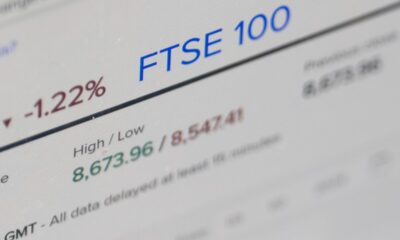Business
Planning for Retirement: How to Secure £100,000 Yearly Income

Achieving a passive income of £100,000 annually during retirement is a significant target that requires careful financial planning. One of the most effective tools for growing wealth over time is a Stocks and Shares ISA. While building a nest egg large enough to support such a withdrawal may seem daunting, it is feasible with a structured approach.
Initial Investment Strategy
Consider an individual who starts their investment journey at the age of 22. They plan to retire at 63, aiming to withdraw £100,000 each year for 25 years. Initially, they decide to contribute £2,000 annually to their Stocks and Shares ISA for the first 15 years. Assuming they achieve an average annual return of 8%, based on historical performance of the S&P 500 and FTSE 100, their contributions will grow significantly.
After 15 years of consistent saving, their investment would accumulate to approximately £54,304. This amount forms the foundational savings that will compound over their investment horizon.
Calculating Future Needs
Next, to determine how much more needs to be saved after the initial 15 years, it is essential to calculate the total retirement pot needed by the age of 63, which is projected to be £1,067,477 in today’s terms. However, to establish a realistic savings strategy, the present value of this future sum must be considered.
To do this, one must discount the future value back to the point in time when the individual turns 38. This involves applying the same 8% annual return rate, leading to a present value of approximately £155,870. By subtracting the already accumulated £54,304, the total required investment after age 38 amounts to around £100,000, which translates into an annual contribution of about £9,515 for the next 25 years.
This example illustrates the power of compound interest and the critical role of time in growing investments. A modest initial investment can lead to substantial wealth over a four-decade period.
Investment Strategy Considerations
To achieve the targeted 8% annual return, investors should focus on building a diversified portfolio that includes high-quality, dividend-paying stocks. One promising option is Aberdeen (LSE: ABDN), a leading asset manager in the FTSE 250. Currently yielding 7.8%, Aberdeen presents an attractive investment opportunity, despite recent challenges that have led to a decline in its share price.
Factors contributing to optimism about Aberdeen include its direct-to-consumer platform, which has gained significant market share, and improvements in its Advisor business, which have started to reverse previous outflows. This shift could bolster profits and enhance dividend payouts in the future.
While risks remain, particularly in light of the current trend toward passive investing strategies, the long-term potential for compounding returns with a well-structured portfolio appears promising.
In conclusion, planning for a retirement income of £100,000 annually is achievable through disciplined saving and strategic investment choices. The journey begins with early contributions and a focus on generating sustainable returns over time.
-

 Entertainment2 months ago
Entertainment2 months agoAnn Ming Reflects on ITV’s ‘I Fought the Law’ Drama
-

 Entertainment3 months ago
Entertainment3 months agoKate Garraway Sells £2 Million Home Amid Financial Struggles
-

 Health2 months ago
Health2 months agoKatie Price Faces New Health Concerns After Cancer Symptoms Resurface
-

 Entertainment2 months ago
Entertainment2 months agoCoronation Street’s Carl Webster Faces Trouble with New Affairs
-

 Entertainment2 months ago
Entertainment2 months agoWhere is Tinder Swindler Simon Leviev? Latest Updates Revealed
-

 Entertainment3 months ago
Entertainment3 months agoKim Cattrall Posts Cryptic Message After HBO’s Sequel Cancellation
-

 Science3 weeks ago
Science3 weeks agoBrian Cox Addresses Claims of Alien Probe in 3I/ATLAS Discovery
-

 Entertainment2 months ago
Entertainment2 months agoOlivia Attwood Opens Up About Fallout with Former Best Friend
-

 Entertainment3 months ago
Entertainment3 months agoMarkiplier Addresses AI Controversy During Livestream Response
-

 Entertainment3 months ago
Entertainment3 months agoMasterChef Faces Turmoil as Tom Kerridge Withdraws from Hosting Role
-

 Entertainment4 months ago
Entertainment4 months agoSpeculation Surrounds Home and Away as Cast Departures Mount
-

 World2 months ago
World2 months agoCole Palmer’s Mysterious Message to Kobbie Mainoo Sparks Speculation





















